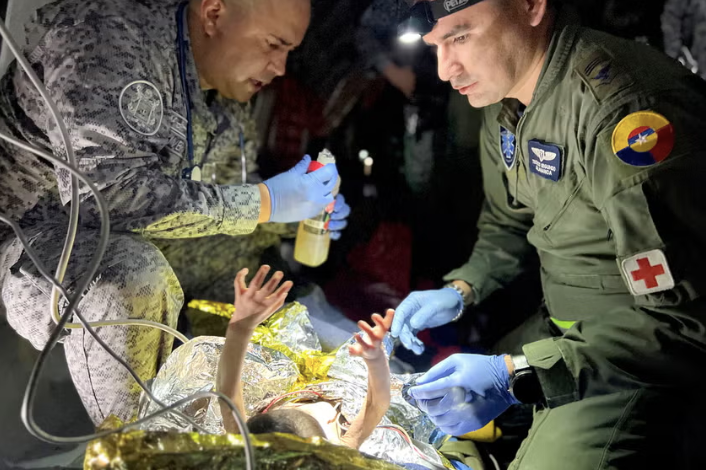How four children survived for 40 days in the jungle

Franks Mayancha and Francesca Mezzenzana write at Slate: "The story of four children’s 40-day survival after a plane crash, in a remote stretch of the Amazon rainforest in Colombia, has gripped the world’s imagination since their rescue on June 9. Traumatized by the loss of their mother a few days after the crash, the siblings were stranded, left to fend for themselves, with no immediate access to water, at continuous risk of encountering predators, venomous snakes, and poisonous plants. Conjuring images of hope and resilience in such a remote place, this story has left many in a state of admiration and surprise. But we feel that a crucial aspect of the story has been overlooked."
What life is like inside North Korea

From the BBC: "On 27 January 2020, North Korea slammed shut its border in response to the pandemic, stopping not just people, but food and goods, from entering the country. Its citizens, who were already banned from leaving, have been confined to their towns. Aid workers and diplomats have packed up and left. Guards are under order to shoot anyone even approaching the border. The world’s most isolated country has become an information black hole. Under the tyrannical rule of Kim Jong Un, North Koreans are forbidden from making contact with the outside world. With the help of the organisation Daily NK, which operates a network of sources inside the country, the BBC has been able to communicate with three ordinary people."
Your brain has tricked you into thinking everything is worse

Adam Mastroianni writes for the New York Times: "Overwhelmingly, people believe that humans are less kind, honest, ethical and moral today than they were in the past. People have believed in this moral decline at least since pollsters started asking about it in 1949, they believe it in every single country that has ever been surveyed (59 and counting), they believe that it’s been happening their whole lives and they believe it’s still happening today. Respondents of all sorts — young and old, liberal and conservative, white and Black — consistently agreed: The golden age of human kindness is long gone. We also found strong evidence that people are wrong about this decline."
What did people think of sharks before the movie Jaws?

From Jess Romeo at JSTOR Daily: "It lives to kill. A mindless eating machine. It will attack and devour anything. It is as if God created the devil, and gave it…jaws. With an ominous two-note score, these are the opening moments of the first trailer for the 1975 blockbuster Jaws. The world has been fascinated and afraid of sharks ever since. Even today, Shark Week, an insanely popular stretch of shark-based programming on the Discovery Channel, similarly exploits sharks as unpredictable and out for blood. But for most of history, sharks were generally considered harmless. At the turn of the twentieth century, swimming started becoming acceptable as recreation. “The average bather knew or cared little about sharks,” writes historian Beryl Francis. Any terrifying tales about the creatures were “accepted as simply sailors’ lore and legend.”
The coolest library on Earth

Elizabeth Landau writes for Hakai magazine: "In a narrow aisle of shelves packed with cardboard boxes, Jørgen Peder Steffensen grins like a mischievous child unwrapping a holiday present as he pulls out a plastic-wrapped hunk of ice from a box marked Keep Frozen. The bag of ice contains the transition from 1 BCE to 1 CE, he says. “That means we have the real Christmas snow.” This piece of ice, a bit longer than his arm, doesn’t visibly look different from modern ice. Yet bubbles trapped in it preserve the chemistry of the air in Greenland from more than two millennia ago. In this freezer facility, Steffensen’s team stores some 40,000 segments of ice cores, long cylinders of ice from polar regions that preserve the history of past climate."
The hunt for the missing train cars from the Orient Express

Jennifer Walker writes for Messy Nessy Chic: "Nothing says old-world luxury quite like the Orient Express. The train of kings, courtesans, spies, storytellers and murderers alike, all elegantly dressed and sipping on Champagne from cut-glass crystal flutes as European landscapes rolled by. The Orient Express, which linked Paris to Istanbul, connecting Europe to Asia on an 81-hour ride operating between 1883 and 1977, didn’t just have an impressive guest list, it also changed the course of history, quite literally, when the armistice was signed in dining carriage 2419D on 11 November 1918, ending World War I. As we approach the 150th anniversary marking the inauguration of the Orient Express, the iconic service is set to make a spectacular comeback, and its journey back to the tracks has been a wild ride that merits a novel of its own."
Her name is Page, don't call her fat
via Cats With Jobs on Twitter




